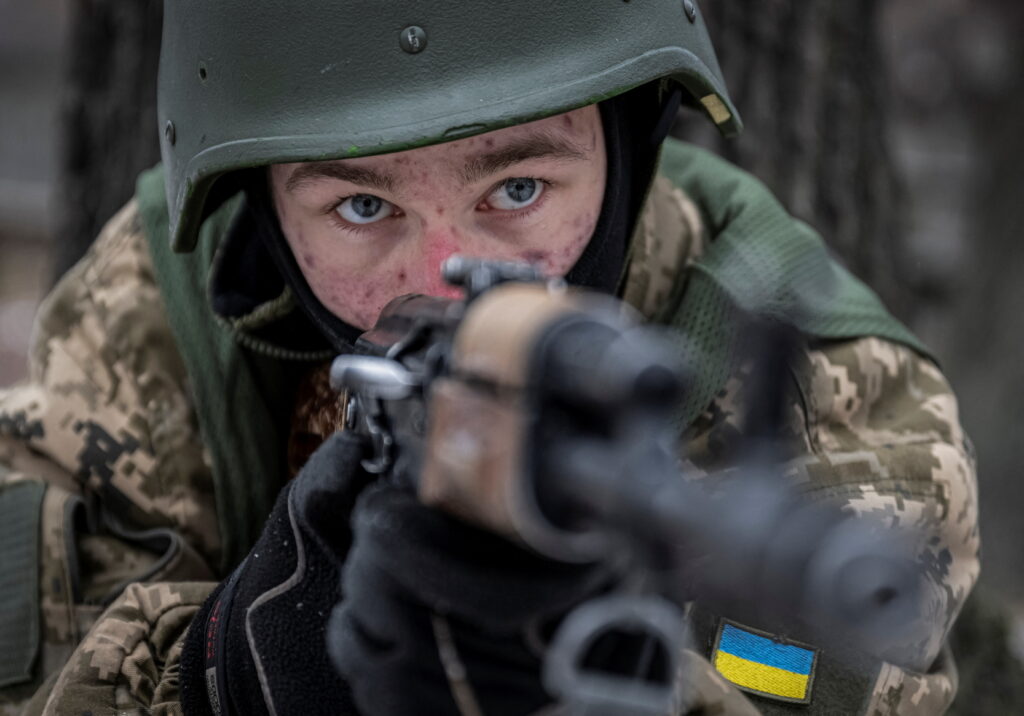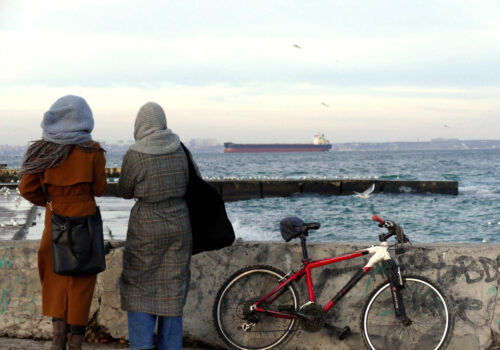Help Ukraine win—or risk kicking off a US losing streak
More than two years into Russia’s war in Ukraine, the once solid wall of US public support for aid to Ukraine has become less vocal. Because of this decrease in discourse supporting Ukraine, a small number of loud detractors is seeking to sway public opinion by asserting that supporting Ukraine isn’t in the United States’ interest. These voices point to the twenty years of war in Iraq and Afghanistan and the tragic consequences of the US and NATO withdrawal from Afghanistan to argue that the United States should not become entangled in another “forever war,” and that instead it should focus on its southern border. These arguments are built on the false sense that US influence abroad, whether it starts or stops, is divorced from any noticeable consequence for most Americans. However, continued assistance to Ukraine is critical if the United States is to retain its position as the world’s indispensable nation and the many benefits Americans enjoy as a result. Failing to support Ukraine now might kick off an American losing streak that could take decades to overcome.
First, Ukraine is not Afghanistan. No US troops are fighting in Ukraine, whereas tens of thousands of US troops invaded Afghanistan to fight an insurgency in a mountainous, landlocked, and poor nation. In contrast, Ukraine borders and aspires to join NATO and the European Union. It has an educated population (with a nearly 100 percent adult literacy rate), and it is connected to the global economy as one of the world’s largest agricultural exporters. Though many Afghans ultimately supported the United States, that support never materialized into the national and political coherence that is already seen among Ukrainians fighting for their right to exist as a democratic nation. Ukraine is protecting its territory from a hostile invasion by Russia—an autocratic nation that supports and is supported by dictators in Syria, Iran, and North Korea.
Supporting Ukraine isn’t charity. It is a way for the United States to reassert itself at a time when its influence is faltering.
Second, while the war has been in an apparent stalemate in recent months, all but the briefest of wars play out in phases. Often, one of the causes of a stalemate is that both sides have run low enough on fresh troops and equipment that they need to reequip and train personnel before they are capable of further large-scale operations. In this sense, the current period of “stalemate” in Ukraine should be seen not as the end-state, but as a finite period to focus on rearming, reequipping, and—importantly—reassessing one’s theory of victory. In this sense, Ukrainian President Volodymyr Zelenskyy’s replacement earlier this year of Valery Zaluzhny with Oleksandr Syrsky as the head of Ukraine’s armed forces looks less like an indication that Ukraine is flailing, and more like a prudent move to set the foundation for a new approach to victory.
The consequences of this war will echo well beyond Europe. Supporting a Ukrainian victory would reassert US global preeminence for around 5 percent of the annual US defense budget, and without the cost of American lives. Continued US global leadership would help shape international issues such as governance of space, artificial intelligence, terrorism, and global migration patterns in the United States’ favor. Russia would be militarily defeated by a reinvigorated American defense industrial base and China would likely reconsider the ability and willingness of the United States to exert its will around the globe, including in defense of Taiwan.
If, however, the United States fails to support Ukraine, expect the opposite. An emboldened Russia is likely to expand its current policy of sowing global discord. Already it has muscled into countries in Africa in hope of capturing raw materials, supported Iranian-backed terrorists in the Middle East that threaten global shipping, and conducted anti-US information and covert operations in Central and South America. Europe would chart a more independent foreign policy and seek to decrease its reliance on the US defense industry and military cooperation. Some may think this is a positive, but the US defense industrial base relies on both US military sales and on sales to allies in NATO and elsewhere. Furthermore, the United States’ ability to defend its global interests—the same interests that give Americans their extraordinary standard of living—would be diminished by nations unwilling to cooperate with an unreliable partner.
Which brings us back to Ukraine. Some argue that the United States must first secure its own borders before supporting Ukraine, but that falsely assumes that the two issues are mutually exclusive or linked. It is possible to both support Ukraine and secure US borders; one does not preclude the other. Others say that Europe should be paying to support Ukraine, which it already is. More than a dozen European nations are spending more than the United States as a share of their gross domestic product, and the European Union as an institution is outspending the United States in terms of total commitments. Finally, some argue that funding Ukraine diverts funds for US capabilities in the Indo-Pacific. This ignores two critical facts: First, most of the funding “for Ukraine” actually goes to support the US defense industrial base. Second, all of the United States’ plans for United States Indo-Pacific Command involve an assumption of some support from European allies. US leaders and policymakers need to ask themselves how realistic that assumption is if they do not support those allies today.
Supporting Ukraine isn’t charity. It is a way for the United States to reassert itself at a time when its influence is faltering. It is a golden opportunity to cement the support of US allies and partners—its greatest advantage over Russia and China. Support to Ukraine isn’t just a good deed, it’s also a good deal. From January 2022 to January 2024, the United States gave roughly $46 billion in military assistance to Ukraine, according to the Kiel Institute for the World Economy. From 1941 to 1945, the United States sent the current equivalent of $831 billion to allies fighting fascist regimes in the Atlantic and Pacific and ultimately had to sacrifice 416,000 American men and women to the cause of freedom. Ukraine can still win without US troops.
In seventy-five years, the only time NATO has invoked its collective defense protocol was to defend the United States after 9/11. And NATO allies sent their troops thousands of miles away to fight an insurgency with the United States. Now, it is Europe that needs help from the United States. Russia has invaded a European nation in what NATO allies see as the greatest security threat to Europe since the Nazis. If the United States turns its back on Ukraine now, it would be abandoning its allies in their time of need. It would be kicking off an American losing streak that could last decades—if not longer.
General Tod D. Wolters (Ret.) is a distinguished fellow with the Atlantic Council’s Scowcroft Center for Strategy and Security. In 2022, Wolters completed a distinguished forty-year active-duty career in the US Air Force as the supreme allied commander Europe (SACEUR) and commander US European command (EUCOM).
Ann Marie Dailey is a nonresident senior fellow at the Transatlantic Security Initiative of the Atlantic Council’s Scowcroft Center for Strategy and Security and is currently serving as a policy researcher at the RAND Corporation. The views, opinions, findings, conclusions, and recommendations contained herein are the author’s alone and not those of RAND or its research sponsors, clients, or grantors.
Further reading
Thu, Mar 14, 2024
Reducing Europe’s reliance on Russian energy imports: Key strategies under five scenarios
Report By Richard L. Morningstar, András Simonyi, Olga Khakova, Paddy Ryan
To better understand how the war’s conclusion—or lack thereof—will impact the options available to transatlantic policymakers, this report analyzes European security across five general scenarios—a Ukrainian victory, a negotiated settlement, a frozen conflict, a protracted conflict, and a Russian victory.
Tue, Mar 12, 2024
Mood darkens in Odesa amid Russian bombardment and Western hesitancy
UkraineAlert By Michael Bociurkiw
The mood in Ukrainian Black Sea port city Odesa has darkened in recent weeks amid a surge in Russian bombing attacks and growing doubts over the future of Western military aid, writes Michael Bociurkiw.
Mon, Mar 11, 2024
Ukraine’s Oscar win puts Russia’s war crimes back in international spotlight
UkraineAlert By Peter Dickinson
Ukraine’s historic Oscar win for the documentary film “20 Days in Mariupol” puts Russia’s war crimes firmly back into the international spotlight, writes Peter Dickinson.
Image: A volunteer who aspire to join the 3rd Separate Assault Brigade of the Ukrainian Armed Forces attends basic training, amid Russia’s attack on Ukraine, at an undisclosed location in the Kyiv region, Ukraine January 9, 2024. REUTERS/Viacheslav Ratynskyi





